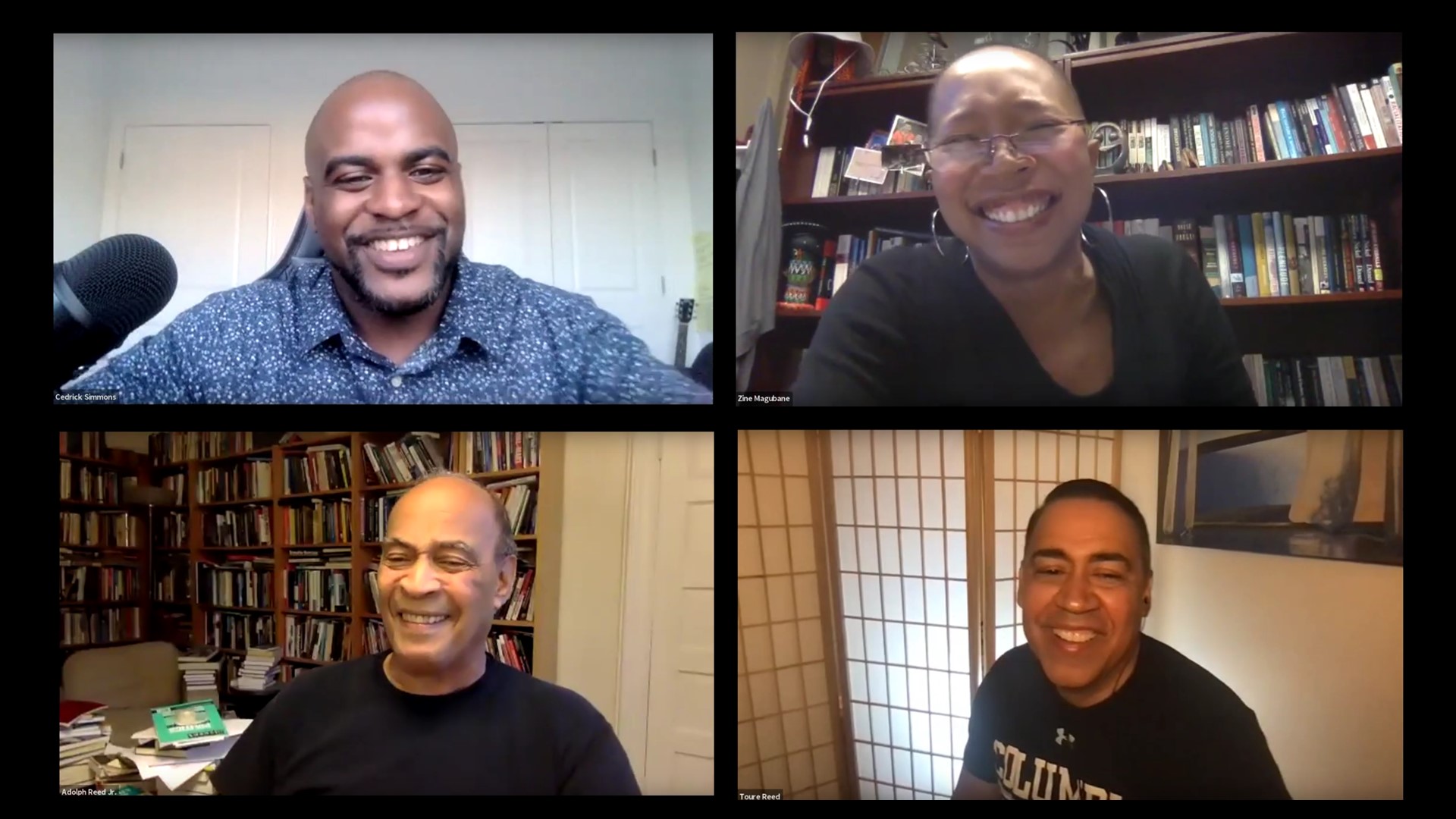On May 14, a panel of scholars came together for a discussion about the concept race reductionism and how it can prevent people from understanding and addressing the sources of inequality. Panelists included Dr. Zine Magubane, Associate Professor of Sociology at Boston College; Dr. Touré Reed, Professor of History at Illinois State University; and Dr. Adolph Reed Jr., Professor Emeritus at the University of Pennsylvania.
The event aimed to explore the decoupling of racial disparities from political economy, and the utility of collective action for individuals seeking to address injustices. Panelists delved into the factors of racism and exploitation by the ruling class that leads to injustice and inequality in the 21st century.
Moderating the event, which was sponsored by many Ithaca College organizations, was Dr. Cedrick-Michael Simmons, Diversity Scholars Fellow in the department of Sociology at Ithaca College. Simmons opened by acknowledging the relevance of the discussion to the Ithaca community: “The Ithaca college community is actively reckoning with the question of how we can better understand and address racism. We’re beginning with the premise, therefore, with this event that our urgency to address racism and other civil rights violations should be paired with an urgency to address economic inequality and Labor rights violations.”
What followed during the panel was a robust conversation, laden with thoughtful digressions, on what was revealed to be an abundance of complex social, economic, and political issues. Dr. Touré Reed, who coined the phrase “Race Reductionism,” delved into the meaning race reductionism at the start of the panel, describing the presumption that race as a category can explain social phenomena. Dr. Reed’s concept of race reductionism sees race as an insufficient factor in explaining complicated issues in the United States. “What we often think of as racial inequalities are actually as much as anything else reflective of broad trends and American political economy,” stated Dr. Reed.
Panelists commented on the inefficiency of modern social justice movements – movements often bolstered by liberal arts schools – that focus too much on vague “squishy” topics like “abolishing white supremacy” and “increasing representation” and detract attention from concrete political and economic sources of inequality. Panelist Dr. Zine Magubane explained that “there is a full-on assault to undermine the notion of a public good as ultimately being beneficial for creating an equal society and also to struggle for real things in real context.”
Similarly, Dr. Touré Reed imparted that “a lot of what people understand to be a radical statement against racial inequality is actually a kind of throwback to a more conservative approach, and it’s a throwback because the demand should be for public goods… to improve the lives of American citizens.”
Dr. Magubane also expressed the issues with viewing race as an impediment to an impartial meritocracy. She explained how focus on issues of race rather than issues of class has hindered progress. “The identitarians are deeply invested in the notion of a meritocracy,” Dr. Magubane explained, “They just want the impediment of race to be removed and then the ‘truly great’ people can get all the stuff that they deserve as the ‘truly great’… and that becomes their definition of a just world: where all the super smart people from each race get all the stuff.”
Dr. Magubane also delved into the sociological roots of race reductionism and the role that sociology has played in the construction of race as a reference to cultural roots. She spoke on how sociology’s reduced construction of race has created limitations in both society’s and higher education’s understanding race. “The whole race and ethnicity conceptual architecture is built upon the idea that race is biological which has been thoroughly refuted,” asserted Magubane. “That architecture is the center of our discipline. All of our courses are called ‘race and ethnicity.’ [That architecture] rests upon that fundamental idea. So really our disciplinary architecture has provided a lot of the common-sense thinking that is extremely wrong.”
Dr. Adolph Reed, a founding member of the U.S Labor Party, contributed notably to the discussion by answering a question regarding difficulties in mobilizing employees of a higher education institution such as Ithaca College. Regarding a question about otherwise sympathetic faculty members – specifically contingent faculty members – being hesitant to show support for a cause or protest out of fear of retaliation from the administration, Reed said “As a practical matter we have to be flexible enough to target the actions that we try to organize with the realistic understanding of what might impede people from taking part in it.” Reed advised that “a prior step would be to engage in practices that build a solidarity…. among the contingent faculty before calling in action.”
Summarizing his advice to his students who express interest in becoming active in the labor movement or any sort of activism, Dr. Reed stated, “Politics isn’t really about demonstrating your purity, it’s about having vision and objectives and trying to mobilize human and other resources to pursue those objectives.
Dr. Magubane concluded by commenting on universities’ and university student’s preoccupation with “sexy,” albeit unattainable issues like “dismantling structural racism” over attainable, consequential economic issues, stating, “The terrain of struggle will have to be moved off [university campuses]. I don’t think lever of change is going to come from universities. Universities will be dragged along kicking and screaming if we ever get to where we want to go.”
Watch the full discussion here:

